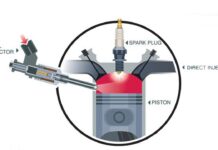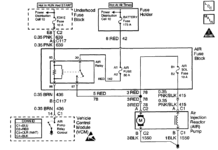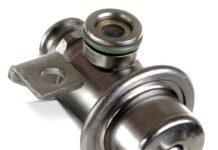How much oil does the engine need to burn? What is the normal amount of oil that the car should lose?
Depending on the engine’s size, most engines need between 5 to 8 liters of oil. A smaller engine will require less oil to fill its volume.
- A 3-cylinder engine consumes an average of 3.5-4 Liters of oil.
- A 4-cylinder engine requires approximately 5 liters of oil.
- An average 6-cylinder engine needs 5-6 liters oil.
- An 8-cylinder engine, depending on the displacement of the engine, uses between 5 to 8 liters oil.
These numbers may vary depending on whether or not the technician changed the oil filter. It is enough to consult the owner’s manual to determine the oil capacity for your vehicle.
No vehicle owner wants to see their engine oil go. However, vehicles can still consume oil from the wear of age. If ignored, engine burning oil can lead to major damage.
Modern engines can travel between 5,000 and 8,000 kilometers. It requires less than half a gallon of oil. Other engines may not reduce oil at all. Oil consumption increases naturally as mileage and wear increase. A high-mileage vehicle will typically consume between 2-3 liters of oil every 3,000 to 5,000 km. The exhaust smoke is an indicator that the engine is burning oil. This may not be apparent in vehicles that only burn a small amount. You can check if there has been a decrease in oil consumption by checking the oil dipstick regularly.
Leakages in the crankshaft and camshaft are the most significant reasons the engine burns oil. Wear or damage to main bearings is another cause. Tolerances of components become wider due to wear. This exposes pistons, rings and other parts to more oil that they can control. The combustion chamber is flooded with excess oil, which burns along with the fuel. This results in a reduction.
Spark plugs can be contaminated by an oil-burning engine. This can cause misfires in ignition, high levels of emissions, catalytic converter and oxygen sensor failures, as well as misfires during ignition. These parts can become contaminated with phosphorus, which can cause malfunctions. An engine that burns oil can often fail the emissions test because of its high hydrocarbon (HC), emissions.
How much oil should the engine burn? And when is too much?
Engine oil burning is a very common problem. However, the oil burning rate can vary depending upon the make and model. One engine’s normal oil consumption may be higher than another. BMW, for example, states that some engines burn 1 liter per 1500 km. GM is a vehicle that is maintained properly and driven 3000km. The vehicle can also reduce oil consumption by an average of 1 Liter. Again, Audi every 1000-1200 km. Subaru 1700 – 2000 km. It has a normal oil consumption of 1 Liter.
The average mileage is 100,000 km. This is the normal oil level for vehicles that have been driven less than 100,000km. (Unless otherwise specified by the manufacturer, a decrease in oil is normal.
Vehicles with more than 150,000 miles should see an increase in oil consumption. Some vehicles may experience this at 120,000km.
Lower viscosity oils are used in many new engines, such as 5W20/0W20/0w40. This is instead of 10W30. These oils are lighter and easier to leak from gaskets or seals that are worn down over time. It causes an increase in oil consumption.
To reduce fat loss, some oil additives are available on the market. These additives do not prevent fat burning but can help to reduce it. Specially formulated “high-mileage” oil oils can be added to reduce oil consumption. High mileage oil can reduce oil consumption and oil burning by switching to it at your next oil change.
Oil consumption can be reduced by switching to a higher viscosity oil. At your next oil change, increase the viscosity one notch. Switch to 5W-30 oil for engines that are currently using 5W-20 oils. You can use 10W-40, 10W-40 or 20W-40 oil if you have an older vehicle. Only for hot weather. It may be too thick to be used in cold conditions.
A study has shown that these are the vehicles that use the most oil.
- 2.25L turbocharged four-cylinder engines or 3.0L V6 engines for Audi A3, A4, A5, A6 or Q5 models
- BMW 5, 6, and X5 models with 4.8L V8 and 4.L twin-turbo engines
- Subaru Outback and Legacy models with 2.0L or 2.5L six cylinder engines.

















